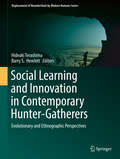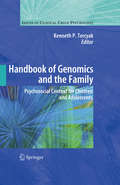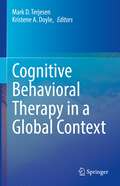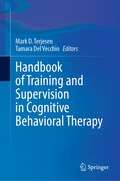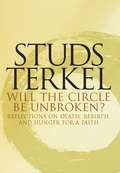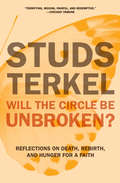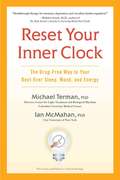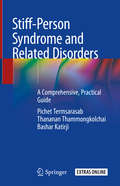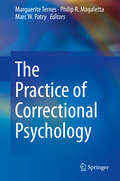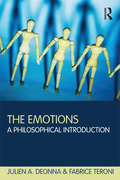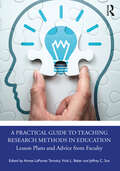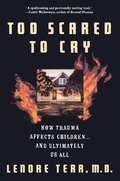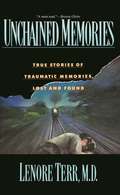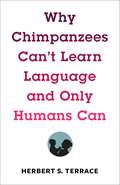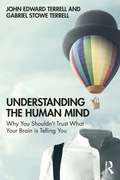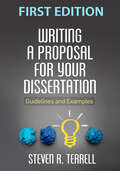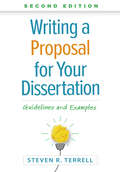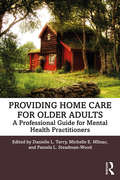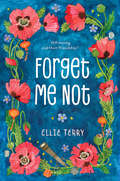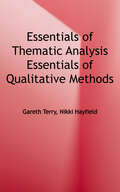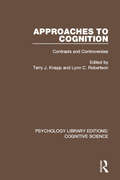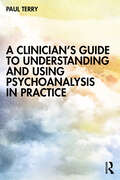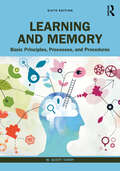- Table View
- List View
Social Learning and Innovation in Contemporary Hunter-Gatherers: Evolutionary and Ethnographic Perspectives (Replacement of Neanderthals by Modern Humans Series)
by Hideaki Terashima Barry S. HewlettThis is the first book to examine social learning and innovation in hunter–gatherers from around the world. More is known about social learning in chimpanzees and nonhuman primates than is known about social learning in hunter–gatherers, a way of life that characterized most of human history. The book describes diverse patterns of learning and teaching behaviors in contemporary hunter–gatherers from the perspectives of cultural anthropology, ecological anthropology, biological anthropology, and developmental psychology. The book addresses several theoretical issues including the learning hypothesis which suggests that the fate of Homo sapiens and Neanderthals in the last glacial period might have been due to the differences in learning ability. It has been unequivocally claimed that social learning is intrinsically important for human beings; however, the characteristics of human learning remain under a dense fog despite innumerable studies with children from urban–industrial cultures. Controversy continues on problems such as: do hunter–gatherers teach? If so, what types of teaching occur, who does it, how often, under what contexts, and so on. The book explores the most basic and intrinsic aspects of social learning as well as the foundation of innovative activities in everyday activities of contemporary hunter–gatherer people across the earth. The book examines how hunter-gatherer core values, such as gender and age egalitarianism and extensive sharing of food and childcare are transmitted and acquired by children. Chapters are grouped into five sections: 1) theoretical perspectives of learning in hunter–gatherers, 2) modes and processes of social learning in hunter–gatherers, 3) innovation and cumulative culture, 4) play and other cultural contexts of social learning and innovation, 5) biological contexts of learning and innovation. Ideas and concepts based on the data gathered through an intensive fieldwork by the authors will give much insight into the mechanisms and meanings of learning and education in modern humans.
Handbook of Genomics and the Family
by Kenneth P. TercyakToday's consumer can send a company a DNA sample and receive a detailed set of genetic test results in return all without ever visiting a health care provider. Although knowing one's personal risk for serious disease may lead some individuals to make more informed health choices, an ever-growing set of questions remains: Are predictive genetic tests meaningful? Can the results be harmful as well as helpful? In what ways can genetic information be used by health care providers to predict disease risk and optimize medical management within concerned families? Most important, how might the landscape of genetic testing affect the care of children's health? Although there are no easy answers, the Handbook of Genomics and the Family details in one authoritative volume the challenges entailed by the latest genetic advances and offers insights into the potential translation of this knowledge in pediatric and family practice and public health. This timely and comprehensive reference introduces readers to the study of how genes, singly and in combination with each other and the environment, affect health and behavior; summarizes current findings on genetics and genomics in disease etiology and prevention; and provides family-focused perspectives relating to genetic counseling and education. Key features of the Handbook include: - In-depth background in genetics and genomics in relationship to disease etiology and epidemiology. - Integrative frameworks for understanding genetics and genomics in the context of families. - Considerations for communicating genetic and genomic information. - Individual chapters on genetic and familial risks for specific diseases and conditions, including cancer, obesity, and Type 1 diabetes among children and adolescents. - Training, ethics, and other emerging issues and controversies. - Contemporary policies on genetic testing in children and families. The Handbook of Genomics and the Family is essential reading for clinical child and pediatric psychologists and psychiatrists, pediatricians and nurses, clinical geneticists and genetic counselors, and public health specialists as advances in genetics lead the way to more personalized models of health.
Cognitive Behavioral Therapy in a Global Context
by Mark D. Terjesen Kristene A. DoyleThis book presents a new approach to understanding the history and practice of cognitive-behavior therapy by presenting country profiles in 38 countries located around the world. The objectives of this edited volume are to provide a broad understanding of the practice of CBT internationally as well as country specific practices that will provide researchers and practitioners with important information for consideration in the application of CBT. The book begins with an introductory chapter by the editors that discusses the history of CBT and the efforts to globalize and disseminate the science and practice of CBT as well as the unique cultural and international variables. The subsequent chapters offer detailed country profiles of the history and practice of CBT from around the globe. More specifically, chapters will provide an overview of the country, a history of psychotherapy in the country, current regulations regarding psychotherapy provision, professional and cognitive behavior therapy organizations, training opportunities/programs in CBT, populations most frequently worked with using CBT in the country, the use and adaptation of CBT, the research on CBT in the country, and CBT with special populations (children, immigrants, HIV+, etc). Many of the nations represented are the most populous and influential ones in their respective regions where CBT has been incorporated into psychotherapy training and practice. Taken as a whole, the countries are quite diverse in terms of sociocultural, economic, and political conditions and the impact of these variables on the practice of CBT in the country will be discussed. The final chapter of the volume offers a summary of the patterns of practice, integrating the main findings and challenges and discussing them within a global context. A discussion of the vision for next steps in the globalization of CBT concludes the book.
Handbook of Training and Supervision in Cognitive Behavioral Therapy
by Mark D. Terjesen Tamara Del VecchioThis book provides a scientific and practical guide for training and supervision in cognitive behavioral therapy (CBT). It builds on more general fundamentals of clinical supervision with a theory-driven approach backed by empirical support for training and supervising clinicians in the practice of CBT. The book dispels the myth of “do it, teach it” as it relates to supervision and addresses the importance of recognizing that one size does not fit all with CBT supervision. The volume synthesizes CBT research on supervision and links it to the practice of supervision. It reviews components of supervision that warrant consideration (e.g., therapeutic alliance, ethics), specific settings (e.g., medical setting, schools) and clients (e.g., culture, individual, group, disability, and high-risk). In addition, it addresses a neglected area of developing competency, including developmental models as well as measuring trainee and supervisor competency in the provision of clinical supervision. The book recommends future directions on how to integrate technology into supervision to enhance the quality of supervision and, ultimately, client outcome. Key areas of coverage include: Major constructs in CBT supervision and training.Supervising work with various clients, including individuals, children, adolescents, families, and couples.Supervision and high-risk cases.Teaching and supervision within a behavioral medicine context.Issues of diversity, technology, and ethics of supervision.The Handbook of Training and Supervision in Cognitive Behavioral Therapy is an essential resource for researchers, professors, and graduate students as well as clinicians, therapists, and other professionals in clinical and school psychology, pediatrics, social work, developmental psychology, behavioral therapy/rehabilitation, child and adolescent psychiatry, nursing, and special education.
Will the Circle Be Unbroken?: Reflections on Death, Rebirth, and Hunger for a Faith
by Studs TerkelStuds Terkel has turned to the ultimate human experience, that of death and the possibility of life afterward. Death is the one experience we all share but cannot know. In Studs Terkel's powerful new book, Will the Circle Be Unbroken? a wide range of people address that final experience and its impact on the present in which we live. In talking about the ultimate and unknowable culmination of our lives, these people give voice to their deepest beliefs and hopes, reflecting on the lives they have led and what still lies before them. The result is a book that may well be Terkel's most popular, a universal and deeply moving account of death and religion.This is the first time Terkel addresses the whole realm of religious belief and of expectations of an afterlife, including reincarnation. Interviewing a fascinating variety of people, he is able to come up with an extraordinary range of experience and of belief, all of which prove far more complex than Terkel anticipated.In the tradition of his books Working and Coming of Age, Studs Terkel addresses an issue bound up with all of our lives, yet rarely discussed on its own terms. From a Hiroshima survivor to an AIDS caseworker, from a death row parolee to a woman who emerged from a two-year coma, these interviewees find an eloquence and grace in dealing with a topic many of us have yet to discuss openly and freely.Terkel also interviews the vast array of people who confront death in their everyday lives, whether as policemen, firemen, emergency health workers, doctors, or nurses. Many of the most moving interviews deal with AIDS, and how the disease has devastated whole communities and forced people to face death at the young ages we associate with centuries past.In a stunning capstone to his extraordinary career, Terkel introduces to us the variety of our reactions to life's ultimate experience.
Will the Circle Be Unbroken?: Reflections on Death, Rebirth, and Hunger for a Faith
by Studs TerkelThe renowned oral historian interviews ordinary people about facing mortality: &“It&’s the unguarded voices he presents that stay with you.&” —The New York Times In this book, the Pulitzer Prize winner and National Book Award finalist Studs Terkel, author of the New York Times bestseller Working, turns to the ultimate human experience: death. Here a wide range of people address the unknowable culmination of our lives, the possibilities of an afterlife, and their impact on the way we live, with memorable grace and poignancy. Included in this remarkable treasury are Terkel&’s interviews with such famed figures as Kurt Vonnegut and Ira Glass as well as with ordinary people, from policemen and firefighters to emergency health workers and nurses, who confront death in their everyday lives. Whether a Hiroshima survivor, a death-row parolee, or a woman who emerged from a two-year coma, these interviewees offer tremendous eloquence as they deal with a topic many are reluctant to discuss openly and freely. Only Terkel, whom Cornel West called &“an American treasure,&” could have elicited such honesty from people reflecting on the lives they have led and what lies before them still. &“Extraordinary . . . a work of insight, wisdom, and freshness.&” —The Seattle Times
Reset Your Inner Clock
by Michael Terman Ian McmahanAn enlightened approach to insomnia, depressed mood, fatigue, and other sleep-related problems of everyday life, harnessing the power of light therapy to reset the natural clock. Sleep problems and depressed mood often go hand in hand, forming a frustrating cycle. Michael Terman, Ph.D., has devoted his career to studying the brain functions that feed these disorders. In Reset Your Inner Clock, Terman and Ian McMahan, Ph.D., reveal the heart of his findings, a powerful program that recalibrates our internal clocks--our exquisitely designed, natural sensitivity to the timing and brightness of light exposure. These delicate mechanisms are often decimated by the modern demands of a 24/7 lifestyle. Beginning with a questionnaire that pinpoints the problem areas, Terman helps readers decipher when their natural internal night begins and ends. The treatment process can then start, incorporating the power of natural light and, when necessary, supplemental light therapy. His approach has brought relief to thousands of sleep sufferers, as well as those burdened by bipolar disorder, seasonal affective disorder, depression, sleep disorders due to around-the-clock work schedules, and other impediments to vibrant health. For the first time, his findings are now available for a general audience, sharing the essential elements of chronobiology in clear, authoritative, scientifically grounded chapters that are easy to apply to a variety of situations.
Stiff-Person Syndrome and Related Disorders: A Comprehensive, Practical Guide
by Pichet Termsarasab Thananan Thammongkolchai Bashar KatirjiThis comprehensive title covers all of the broad aspects of stiff-person spectrum disorders (SPSD), ranging from clinical features and laboratory investigations to the basic scientific roles of neuroimmunology and genetics that aid clinicians in understanding the pathogenesis of this disorder.Organized across 15 chapters, this highly practical book begins with a thorough account of the history and clinical phenomenology of SPSD. Subsequent chapters then delve into the differential diagnoses of the disorder, as well as its electrophysiology, immunopathogenesis, and neurochemistry. Following this is an analysis of each subtype of SPSD including classic stiff-person syndrome and its variants, correlations between clinical phenotypes and antibodies, as well as SPSD in the pediatric population. Finally, the book concludes with an examination of the various SPSD diagnostic approaches, treatments, and potential emergencies seen in clinical practice.Developed by a renowned multidisciplinary authorship, Stiff-Person Syndrome and Related Disorders is an indispensable contribution to the clinical literature and will be of great interest to both clinicians and basic science researchers.
Ferngesteuert?!: Hin zur digitalen Souveränität
by Anabel TernèsFerngesteuert oder digital souverän – wie leben Sie und wie möchten Sie leben? Das Buch Ferngesteuert?! Hin zur digitalen Souveränität entschlüsselt mit spannenden und lebendigen Beispielgeschichten die Hintergründe für unsere Verhaltensweisen im digitalen Alltag. Dieses Buch zeigt uns Möglichkeiten auf, wie wir aus einem bequemen digitalen Ferngesteuert-sein in unserem Alltag ausbrechen können. Dazu vermittelt es, wie wir zu mehr Lebensfreude finden, unserem Leben mehr Sinn geben und unsere Zukunft wieder selbst in die Hand nehmen können. Last but not least macht es Lust darauf, wieder selbst zu entscheiden - das eigene Leben in die Hand zu nehmen, Zukunft als Chance zur eigenverantwortlichen Selbstverwirklichung zu sehen und die Vorteile der Digitalisierung souverän im Leben umzusetzen. Zur Autorin: Anabel Ternès ist eine der führenden Köpfe für Digitalisierungsthemen in Deutschland. Als Digitalunternehmerin, Zukunftsexpertin, Autorin, Verwaltungsrätin und Professorin mit einem großen Engagement für Kinderrechte, Bildung und gesunde werteorientierte Digitalisierung sieht und bewegt Anabel Ternès von Hattburg die großen Herausforderungen, die gelöst werden müssen, um unsere Demokratie und soziale Marktwirtschaft in eine lebenswerte Zukunft für alle zu führen.
The Practice of Correctional Psychology
by Marguerite Ternes Philip R. Magaletta Marc W. PatryThis highly accessible volume tours the competencies and challenges relating to contemporary mental health service delivery in correctional settings. Balancing the general and specific knowledge needed for conducting effective therapy in jails and prisons, leading experts present eclectic theoretical models, current statistics, diagnostic information, and frontline wisdom. Evidence-based practices are detailed for mental health assessment, treatment, and management of inmates, including specialized populations (women, youth) and offenders with specific pathologies (sexual offenders, psychopaths). And readers are reminded that correctional psychology is in an evolutionary state, adapting to the diverse needs of populations and practitioners in the context of reducing further offending. Included in the coverage:· Assessing and treating offenders with mental illness. · Substance use disorders in correctional populations.· Assessing and treating offenders with intellectual disabilities.· Assessing and treating those who have committed sexual offenses.· Self-harm/suicidality in corrections.· Correctional staff: The issue of job stress. The Practice of Correctional Psychology will be of major interest to psychologists, social workers, and master’s level clinicians and students who work in correctional institutions and settings with offenders on parole or probation, as well as other professionals within the correctional system who work directly with offenders, such as probation officers, parole officers, program officers, and corrections officers.
The Emotions: A Philosophical Introduction
by Fabrice Teroni Julien DeonnaThe emotions are at the centre of our lives and, for better or worse, imbue them with much of their significance. The philosophical problems stirred up by the existence of the emotions, over which many great philosophers of the past have laboured, revolve around attempts to understand what this significance amounts to. Are emotions feelings, thoughts, or experiences? If they are experiences, what are they experiences of? Are emotions rational? In what sense do emotions give meaning to what surrounds us? The Emotions: A Philosophical Introduction introduces and explores these questions in a clear and accessible way. The authors discuss the following key topics: the diversity and unity of the emotions the relations between emotion, belief and desire the nature of values the relations between emotions and perceptions emotions viewed as evaluative attitudes the link between emotions and evaluative knowledge the nature of moods, sentiments, and character traits. Including chapter summaries and guides to further reading, The Emotions: A Philosophical Introduction is an ideal starting point for any philosopher or student studying the emotions. It will also be of interest to those in related disciplines such as psychology and the social sciences.
A Practical Guide to Teaching Research Methods in Education: Lesson Plans and Advice from Faculty
by Aimee LaPointe Terosky Vicki L. Baker Jeffrey C. SunA Practical Guide to Teaching Research Methods in Education brings together more than 60 faculty experts. The contributors share detailed lesson plans about selected research concepts or skills in education and related disciplines, as well as discussions of the intellectual preparation needed to effectively teach the lesson. Grounded in the wisdom of practice from exemplary and award-winning faculty from diverse institution types, career stages, and demographic backgrounds, this book draws on both the practical and cognitive elements of teaching educational (and related) research to students in higher education today. The book is divided into eight sections, covering the following key elements within education (and related) research: problems and research questions, literature reviews and theoretical frameworks, research design, quantitative methods, qualitative methods, mixed methods, findings and discussions, and special topics, such as student identity development, community and policy engaged research, and research dissemination. Within each section, individual chapters specifically focus on skills and perspectives needed to navigate the complexities of educational research. The concluding chapter reflects on how teachers of research also need to be learners of research, as faculty continuously strive for mastery, identity, and creativity in how they guide our next generation of knowledge producers through the research process. Undergraduate and graduate professors of education (and related) research courses, dissertation chairs/committee members, faculty development staff members, and graduate students would all benefit from the lessons and expert commentary contained in this book.
Too Scared to Cry: How Trauma Affects Children ... and Ultimately Us All
by Lenore TerrIn 1976 twenty?six California children were kidnapped from their school bus and buried alive for motives never explained. All the children survived. This bizarre event signaled the beginning of Lenore
Unchained Memories: True Stories of Traumatic Memories, Lost and Found
by Lenore TerrCan a long-forgotten memory of a horrible event suddenly resurface years later? How can we know whether a memory is true or false? Seven spellbinding cases shed light on why it is rare for a reclaimed memory to be wholly false. Here are unforgettable true stories of what happens when people remember what they’ve tried to forget-plus one case of genuine false memory. In the best detective-story fashion, using her insights as a psychiatrist and the latest research on the mind and the brain, Lenore Terr helps us separate truth from fiction.
Why Chimpanzees Can't Learn Language and Only Humans Can (Leonard Hastings Schoff Lectures)
by Herbert S. TerraceIn the 1970s, the behavioral psychologist Herbert S. Terrace led a remarkable experiment to see if a chimpanzee could be taught to use language. A young ape, named “Nim Chimpsky” in a nod to the linguist whose theories Terrace challenged, was raised by a family in New York and instructed in American Sign Language. Initially, Terrace thought that Nim could create sentences but later discovered that Nim’s teachers inadvertently cued his signing. Terrace concluded that Project Nim failed—not because Nim couldn’t create sentences but because he couldn’t even learn words. Language is a uniquely human quality, and attempting to find it in animals is wishful thinking at best. The failure of Project Nim meant we were no closer to understanding where language comes from.In this book, Terrace revisits Project Nim to offer a novel view of the origins of human language. In contrast to both Noam Chomsky and his critics, Terrace contends that words, as much as grammar, are the cornerstones of language. Retracing human evolution and developmental psychology, he shows that nonverbal interaction is the foundation of infant language acquisition, leading up to a child’s first words. By placing words and conversation before grammar, we can, for the first time, account for the evolutionary basis of language. Terrace argues that this theory explains Nim’s inability to acquire words and, more broadly, the differences between human and animal communication. Why Chimpanzees Can’t Learn Language and Only Humans Can is a masterful statement of the nature of language and what it means to be human.
Understanding the Human Mind: Why you shouldn’t trust what your brain is telling you
by John Edward Terrell Gabriel Stowe TerrellDrawing on current research in anthropology, cognitive psychology, neuroscience, and the humanities, Understanding the Human Mind explores how and why we, as humans, find it so easy to believe we are right—even when we are outright wrong. Humans live out their own lives effectively trapped in their own mind and, despite being exceptional survivors and a highly social species, our inner mental world is often misaligned with reality. In order to understand why, John Edward Terrell and Gabriel Stowe Terrell suggest current dual-process models of the mind overlook our mind’s most decisive and unpredictable mode: creativity. Using a three-dimensional model of the mind, the authors examine the human struggle to stay in touch with reality—how we succeed, how we fail, and how winning this struggle is key to our survival in an age of mounting social problems of our own making. Using news stories of logic-defying behavior, analogies to famous fictitious characters, and analysis of evolutionary and cognitive psychology theory, this fascinating account of how the mind works is a must-read for all interested in anthropology and cognitive psychology.
Writing a Proposal for Your Dissertation
by Steven R. TerrellThis user-friendly guide helps students get started on--and complete--a successful doctoral dissertation proposal by accessibly explaining the process and breaking it down into manageable steps. Steven R. Terrell demonstrates how to write each chapter of the proposal, including the problem statement, purpose statement, and research questions and hypotheses; literature review; and detailed plan for data collection and analysis. Of special utility, end-of-chapter exercises serve as building blocks for developing a full draft of an original proposal. Numerous case study examples are drawn from across the social, behavioral, and health science disciplines. Appendices present an exemplary proposal written three ways to encompass quantitative, qualitative, and mixed-methods designs. Pedagogical Features: *"Let's Start Writing" exercises leading up to a complete proposal draft. *"Do You Understand?" checklists of key terms plus an end-of-book glossary. *End-of-chapter quizzes with answers. *Case study examples from education, psychology, health sciences, business, and information systems. *Sample proposal with three variants of the methods chapter: quantitative, qualitative, and mixed methods.
Writing a Proposal for Your Dissertation: Guidelines and Examples
by Steven R. TerrellThe encouraging book that has guided thousands of students step by step through crafting a strong dissertation proposal is now in a thoroughly revised second edition. It includes new guidance for developing methodology-specific problem statements, an expanded discussion of the literature review, coverage of the four-chapter dissertation model, and more. Terrell demonstrates how to write each chapter of the proposal, including the problem statement, purpose statement, and research questions and hypotheses; literature review; and detailed plans for data collection and analysis. "Let's Start Writing" exercises serve as building blocks for drafting a complete proposal. Other user-friendly features include case-study examples from diverse disciplines, &“Do You Understand?&” checklists, and end-of-chapter practice tests with answers. Appendices present an exemplary proposal written three ways to demonstrate quantitative, qualitative, and mixed methods approaches, and discuss how to structure a four-chapter dissertation. New to This Edition *Introduction offering a concise overview of the entire proposal-writing process and the doctoral experience. *Additional help with tailoring problem and purpose statements for quantitative, qualitative, and mixed-methods studies. *Expanded discussion of the review of literature, including a criterion for judging the quality of primary versus secondary sources. *Many new examples from different disciplines, such as studies of depression treatments, approaches to reducing offender recidivism, health effects of irradiated crops, strength training in college football, and remote teaching and learning during COVID-19. *Focus on the five-chapter model is broadened to include specific guidance for four-chapter dissertations. *Broader, more detailed reference list and glossary.
Providing Home Care for Older Adults: A Professional Guide for Mental Health Practitioners
by Danielle L. TerryA practical guide to providing home-based mental health services, Providing Home Care for Older Adults teaches readers how to handle the unique aspects of home-based care and apply and adapt evidence-based assessment and treatment within the home-based setting. Featuring contributions from experienced, board-certified home care psychologists, social workers, and psychiatrists, the book explains the multifaceted role of a home-based provider, offers concrete and practical considerations for working within the home, and highlights adaptations to specific evidence-based methods used in treating homebound older adults. Also covered are special topics related to hoarding, safety, capacity evaluations, caregivers, case management, and use of technology. Each chapter includes engaging case examples with practical tips that illustrate what it is like to work in this new and exciting frontier. Psychologists, counselors, and other mental health practitioners in home settings will be able to use this guide to provide effective home-based care to older adults.
Forget Me Not
by Ellie TerryAstronomy-loving Calliope June has Tourette syndrome, so she sometimes makes faces or noises that she doesn't mean to make. When she and her mother move yet again, she tries to hide her TS. But it isn't long before the kids at her new school realize she's different. Only Calliope's neighbor, who is also the popular student body president, sees her as she truly is--an interesting person and a good friend. But is he brave enough to take their friendship public? As Calliope navigates school, she must also face her mother's new relationship and the fact that they might be moving--again--just as she starts to make friends and finally accept her differences. Ellie Terry's affecting debut will speak to a wide audience about being true to oneself.
Essentials of Thematic Analysis (Essentials of Qualitative Methods)
by Gareth Terry Nikki HayfieldThe brief, practical texts in the Essentials of Qualitative Methods series introduce social science and psychology researchers to key approaches to qualitative methods, offering exciting opportunities to gather in-depth qualitative data and to develop rich and useful findings. In this book, Gareth Terry and Nikki Hayfield introduce readers to reflexive thematic analysis, a method of analyzing interview and focus group transcripts, qualitative survey responses, and other qualitative data. <p><p>Central to this method is the recognition that we are all situated in a particular context, and that we see and speak from that position. This leads researchers to produce knowledge that represents situated truths, providing insights into people's perspectives on a given topic. <p><P>About the Essentials of Qualitative Methods book series: <p>Even for experienced researchers, selecting and correctly applying the right method can be challenging. In this groundbreaking series, leading experts in qualitative methods provide clear, crisp, and comprehensive descriptions of their approach, including its methodological integrity, and its benefits and limitations. Each book includes numerous examples to enable readers to quickly and thoroughly grasp how to leverage these valuable methods.
Approaches to Cognition: Contrasts and Controversies (Psychology Library Editions: Cognitive Science)
by TERRY J. KNAPP AND LYNN C. ROBERTSONTo the vast majority of academic psychologists in the 1980s, the study of cognition referred to that area of psychology known as ‘cognitive psychology’. The major basis of this area had been the computer metaphor with its accompanying notion of the individual as an information-processing system. Yet within the field the study of cognition is much broader and has a history that reaches into antiquity, whereas ‘cognitive psychology’ as information-processing psychology had only recently become the standard bearer of cognitive studies. One of the purposes of this volume, originally published in 1986, was to articulate some of the fundamental distinctions between and concordances among different orientations concerning the study of cognition. The collection includes chapters on information processing, ecological, Gestalt, physiological, and operant psychology.
A Clinician’s Guide to Understanding and Using Psychoanalysis in Practice
by Paul TerryThis book provides an intimate portrait of a clinician’s psychoanalytic approach to working in the public health sector with people suffering from acute and chronic emotional pain. Drawing on three central psychoanalytic concepts of countertransference, projective identification, and the destructive superego, Paul Terry weaves together a unique and distinctive psychoanalytically-based approach to psychotherapeutic work. He illustrates this approach in detailed, almost moment-by-moment case studies of his work with people suffering from depression, psychosis, dependency, loneliness, dementia, and terminal illness. He also shows how his approach helps him to understand social and political issues of war, the holocaust, entitlement, and sexual identity. For readers unfamiliar with psychoanalytic theory, the book concludes with an appendix in which there is a summary of some Kleinian psychoanalytic concepts and psychoanalytic studies of psychosis. This informative, compelling, and moving book will act as a valuable resource for students training in psychoanalysis and to work in public settings along with career psychologists and mental health professionals seeking to better understand their clients and experiences.
Introduction to the Senses
by Terry R.J. BossomaierAn understanding of the senses - vision, hearing, touch, chemical and other non-human senses - is important not only for many fields of biology but also in applied areas such as human computer interaction, robotics and computer games. Using information theory as a unifying framework, this is a wide-ranging survey of sensory systems, covering all known senses. The book draws on three unifying principles to examine senses: the Nyquist sampling theorem; Shannon's information theory; and the creation of different streams of information to subserve different tasks. This framework is used to discuss the fascinating role of sensory adaptation in the context of environment and lifestyle. Providing a fundamental grounding in sensory perception, the book then demonstrates how this knowledge can be applied to the design of human-computer interfaces and virtual environments. It is an ideal resource for both graduate and undergraduate students of biology, engineering (robotics) and computer science.
Learning and Memory: Basic Principles, Processes, and Procedures
by W. Scott TerryLearning and Memory provides a balanced review of the core methods and the latest research on animal learning and human memory. Topical coverage ranges from the basic and central processes of learning, including classical and instrumental conditioning and encoding and storage in long-term memory, to topics not traditionally covered, such as spatial learning, motor skills, and implicit memory. The general rules of learning are reviewed along with the exceptions, limitations, and best applications of these rules. Alternative approaches to learning and memory, including cognitive, neuroscientific, functional, and behavioral, are also discussed. Individual differences in age, gender, learning abilities, and social and cultural background are explored throughout the text and presented in a dedicated chapter. The relevance of basic principles is highlighted throughout the text with everyday examples that ignite reader interest in addition to more traditional examples from human and animal laboratory studies. Research examples are drawn from education, neuropsychology, psychiatry, nursing, and ecological (or everyday) memory. Each chapter begins with an outline and concludes with a detailed summary. Applications and extensions are showcased in text boxes as well as in distinct applications sections in every chapter, and review and recapitulation sections are interspersed throughout the chapters.
